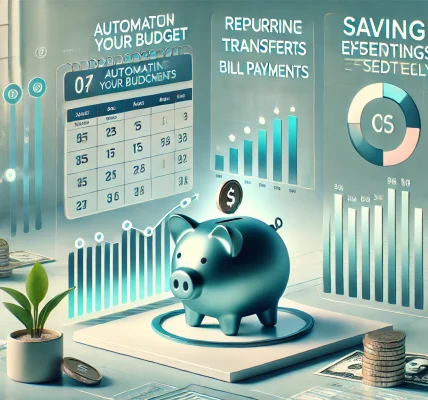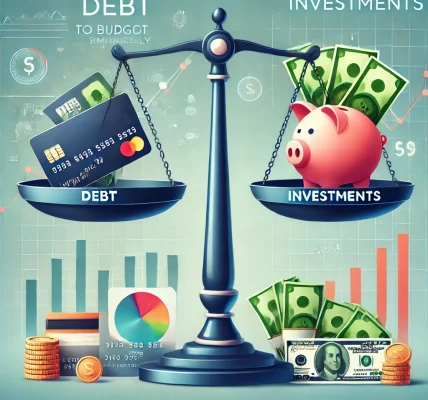📚 Introduction
Debt repayment can feel overwhelming, especially when multiple loans and high-interest payments are involved. Without a clear plan, it’s easy to fall into a cycle of minimum payments and mounting interest, delaying financial freedom.
Budgeting plays a crucial role in accelerating debt repayment by:
✅ Helping prioritize high-interest debts
✅ Identifying areas to cut expenses and redirect savings
✅ Providing a structured approach to meet repayment goals
This comprehensive guide will explore proven budgeting strategies to eliminate debt faster while staying legally compliant and avoiding financial pitfalls.
💡 Why Budgeting is Essential for Debt Repayment
📊 1. Creates a Clear Financial Overview
A budget gives a clear snapshot of income, expenses, and debt obligations, allowing you to identify spending patterns and areas for improvement.
🏦 2. Helps Prioritize Debt Repayment
By assigning a specific portion of income toward debt payments, a budget ensures that debt repayment remains a top financial priority.
📉 3. Prevents Accumulation of New Debt
With a well-structured budget, you can control discretionary spending and avoid relying on credit cards or loans for everyday expenses.
⏩ 4. Speeds Up Debt Elimination
A focused budget helps allocate extra payments toward high-interest debt, allowing you to clear debts faster and save on interest payments.
📚 Types of Debt Repayment Strategies and Their Role in Budgeting
⚡ 1. The Snowball Method
✅ Focus: Pay off the smallest debt first, then move to the next largest.
✅ Role of Budgeting: Allocates minimum payments to all debts while applying any extra funds to the smallest debt.
✅ Advantage: Provides quick wins and boosts motivation to stay on track.
📈 2. The Avalanche Method
✅ Focus: Prioritize paying off debts with the highest interest rates first.
✅ Role of Budgeting: Allocates extra payments toward high-interest debt while maintaining minimum payments on others.
✅ Advantage: Saves money on interest and accelerates overall debt repayment.
📉 3. Debt Consolidation Strategy
✅ Focus: Combine multiple debts into one loan with a lower interest rate.
✅ Role of Budgeting: Ensures that consolidated payments fit within monthly income while preventing overspending.
✅ Advantage: Simplifies repayment with a single monthly payment.
🏆 4. 50/30/20 Budgeting Rule
✅ Focus: Allocate 50% of income to needs, 30% to wants, and 20% to debt repayment and savings.
✅ Role of Budgeting: Ensures a balanced approach by dedicating a fixed percentage of income toward debt.
✅ Advantage: Maintains a balance between financial goals and lifestyle choices.
📈 Step-by-Step Guide to Using Budgeting to Eliminate Debt
🎯 Step 1: Assess Your Financial Situation
✅ List All Debts: Include balances, interest rates, and minimum payments.
✅ Track Income and Expenses: Identify how much you can allocate toward debt repayment.
🎯 Step 2: Set a Realistic Debt Repayment Goal
✅ Define a Timeline: Aim to pay off high-interest debts within a specific period.
✅ Set Monthly Repayment Targets: Establish achievable targets to ensure steady progress.
🎯 Step 3: Choose a Debt Repayment Strategy
✅ Pick the Right Method: Decide between the snowball or avalanche method based on your financial situation.
✅ Allocate Extra Payments: Direct any additional income (bonuses, tax refunds) toward high-interest debts.
🎯 Step 4: Adjust Your Budget to Prioritize Debt Repayment
✅ Cut Discretionary Expenses: Reduce spending on non-essential categories such as dining out and entertainment.
✅ Reallocate Savings Toward Debt: Shift a portion of savings or investments to accelerate repayment.
🎯 Step 5: Track Progress and Make Adjustments
✅ Monitor Monthly Payments: Ensure payments align with your initial budget.
✅ Reevaluate Every 3-6 Months: Assess progress and adjust the budget as needed to stay on course.
📚 Practical Budgeting Techniques to Accelerate Debt Elimination
💸 1. Zero-Based Budgeting
✅ How It Works: Assign every dollar of income a purpose, ensuring nothing is left unallocated.
✅ Benefit: Allows for precise control over expenses and increased focus on debt repayment.
📊 2. Envelope System for Variable Spending
✅ How It Works: Use cash envelopes for discretionary spending categories (e.g., groceries, dining).
✅ Benefit: Prevents overspending and ensures remaining funds go toward debt payments.
📉 3. Automatic Payments and Extra Principal Payments
✅ How It Works: Set up automated payments to ensure consistency and discipline.
✅ Benefit: Prevents missed payments and reduces the risk of accumulating additional debt.
🚩 Common Budgeting Mistakes to Avoid When Repaying Debt
❗ 1. Not Accounting for Irregular Expenses
Failure to account for annual fees, medical bills, and seasonal expenses can derail progress.
❗ 2. Continuing to Use Credit Cards
Using credit cards while repaying debt increases balances and adds to interest costs.
❗ 3. Failing to Adjust Your Budget Regularly
Ignoring changes in income or expenses may slow down debt repayment.
🕵️ Hidden Costs to Watch Out for While Paying Off Debt
🔎 1. Prepayment Penalties: Check if your loan has penalties for early repayment.
🔎 2. Balance Transfer Fees: Understand the terms of any balance transfer offers.
🔎 3. Late Payment Charges: Avoid missed payments to prevent late fees and higher interest.
📈 Success Stories: Real-Life Examples of Debt Elimination Through Budgeting
🎉 Case Study 1: Student Loan Payoff Using the Avalanche Method
A recent graduate cleared ₹5,00,000 of student loan debt in 3 years by aggressively paying off high-interest loans while maintaining a strict budget.
🎉 Case Study 2: Credit Card Debt Elimination Using Zero-Based Budgeting
A family successfully paid off ₹2,50,000 in credit card debt in 2 years by tracking every rupee and cutting unnecessary expenses.
🎯 Final Tips to Eliminate Debt Faster Through Budgeting
✅ Be Consistent: Stick to your budget and avoid unnecessary spending.
✅ Review Your Progress Regularly: Make adjustments to ensure you stay on track.
✅ Celebrate Small Wins: Recognize milestones to stay motivated throughout your debt-free journey.
📢 Conclusion: Achieve Financial Freedom Through Smart Budgeting
By leveraging the power of budgeting, you can take control of your debt and eliminate it faster. Whether you choose the snowball or avalanche method, maintaining a focused and consistent budget will accelerate your journey toward a debt-free life.
Pro Tip: Track progress using a budgeting app and stay motivated by visualizing your debt-free future!



